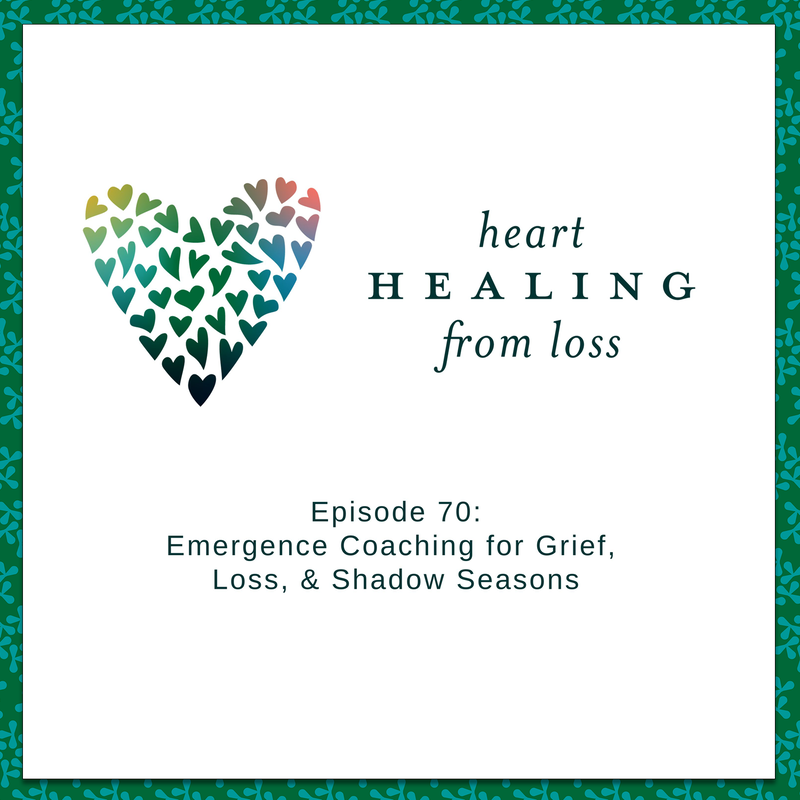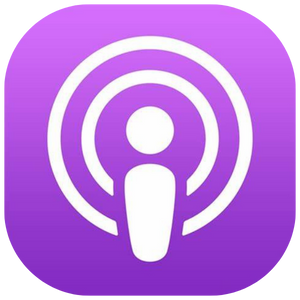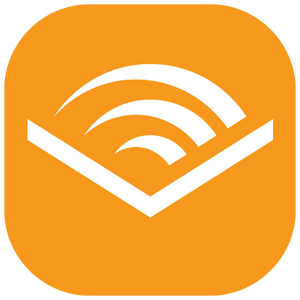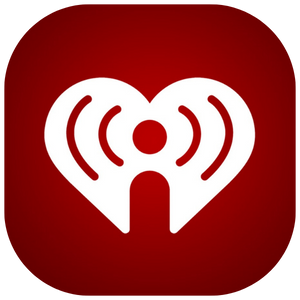Episode 61: Trying On New Kinds of Support
|
Taking that first step to seek support is a big one!
Deciding to take on navigating through grief and loss is challenging enough; finding the right kind of support can be a whole new level of hard. If you break your arm, you don’t wear someone else’s cast. If you’re ill, you don’t take someone else’s medicine. So why would you settle for the wrong kind of emotional support? What is needed in your journey? In this episode, Grief Coach Wendy Sloneker talks about making the needed assessments for starting the journey. What kinds of support are out there? What have you already tried? How do you find the right type of support and then figure out how to keep it working for you as you go along? A one-size-fits-all approach is most often a one-size-fits-none-comfortably, so it’s important to know what you already have in place. Navigating what is needed from there is part of how Wendy helps her clients explore their options. |
If you think you might be ready to take that first step in seeking support for navigating grief and loss, set up a confidential, complimentary call with Wendy at https://www.wendysloneker.com/.
As seen on: |
|
Full Episode Transcript
Wendy Sloneker
You are listening to the Heart Healing from Loss podcast. This is episode 61. I'm Wendy Sloneker. Hi.
Hey, I've been thinking about you, I'm actually out, waiting for a friend to come, I'm parked in front of my, I decided to park in the sunshine, even though it's not really a warm sunshine, it's bright and cold, but it feels better to me to park in the sun. So that's where we are.
How you doing? I had a session yesterday with a client and I wanted to share a couple of a couple of things, not of their session directly. But I think when it comes to entertaining, the thought of getting support and working through tough stuff, there's so much just like general unknown, that it is easy to not entertain it for very long, much less, go through and and, and get it or sign up for yourself or invest in yourself or even get a little bit more information.
So this leads me to a more general observation and try it on with me. Because you might be like in this boat or in this camp, and you might not be so let's just try it on. This was true for me. When I was first looking at options for help and support, and they were not grief, related that I knew of they were more like therapy, psychoanalysis, psychology, these kinds of support things. For a while it felt like work. And there was a lot of resistance and reticence about doing it when I was already very busy and feeling bad.
So when I framed it in my own mind, because that's what I had to work with. That's, that's what I was going with it was other people's experiences. And this was back in the 1900s. Folks, so like late 1900s Yes, but at the same time 80s 90s This kind of thing. It was I imagined that saying it, you know the 1900 sounds really far back there. But it was the 80s and 90s. Right. So it was it was counseling, it was therapy, it was stuff like that. And it was spoken about less like people weren't going to the, you know, wherever they were going, I was in my early. What was it 20s. It was I was in my teens in the 80s, 20s in the 90s. And beyond that, you know. So yeah, I was just around, I must been like 25 when I went into see my first counselor on my own by myself with my own money, and I can't recall whether or not this particular counselor took insurance or not.
But I didn't know what to expect. And there was a bit about that. That was like the unknown I was game I knew I needed some kind of help. But there was a distinction between like it felt like it was going to be work, because it was going to be new and like the only thing I really had to measure that against was working a job or the work I did in school. So either way, either one of those it was work. And that honestly did not help or assist me to receiving support or experiencing support. Because we think we have to do it or we think we should know it or things like this.
So let me know if that registers with you. And I'm talking about like different kinds of support. I'm pretty eager to try out different kinds of support for me personally and professionally. But also like that can be like email check ins, text check ins, do I have a preference between either one of those is there and these are things that I asked my clients our preference. Would you rather talk on the phone? Once we decide on whether or not you know you would like to check in this kind of thing?
I think it, it helps everybody sort of assess what their own preferences are, in terms of receiving, which is also something that then I think we could all use just a little bit of intentional care with. So this is an interesting I wanted to this is interesting to me anyway, I'm wondering if it's interested, interesting to you. What kinds of support do you like? Prefer? Which ones would you like to try? Like, wow, I would like to try more body work support. I'm recently started a rowing class regimen at my local row house, shout out Rowhouse West Seattle. And it's fun, I'm discovering like, oh, wow, the loved one. And again, I'm finding that there's some fun, there's some lift there. For me, emotionally and physically.
And, you know, honestly, people don't really realize, I think there's a an assumption that when you're working through grief and loss feelings, that it's always going to be, like, so heavy, and so, so many really painful emotions. And that's true, they they exist. And it can't be that for 55 minutes in a row, just, it just can't. That has not been my experience as a client or as a coach, when I'm coaching clients, however, I do want to share a couple things that can happen inside of the first 10 sessions, because people are like, yeah, okay, well, it'd be great to process, grief and loss, but I really don't know what that means or feels like. So I want to give you some other kinds of results that can happen along the way.
So we do have the initial sort of wave, and release of the initial painful emotions or whatever gets presented like the for you, there can be momentum that builds immediately as we begin lifting out the initial wave of painful emotions, like yeah, that can totally start in the first session. And then we just build on that in a safe and gentle way. There is such a thing as acknowledging progress all along the way, which integrates and helps people sort of claim their progress that has been made.
This particular client experience setting boundaries with themselves and others, inside of 10 sessions, there was some pretty excellent and supported decision making meaning. I have no part in decision making, but I asked questions around topics, and then the client makes the decisions. And that's what that means is having time and space to explore, look at see it from different angles and sides from a person who has no investment in whether or not this decision gets made or not. Okay, what do you think about that, and let's, let's look at it from a couple places. There was some celebration and integration of new awareness and new choices like behavior patterns that have changed and shifted. They mentioned that they received new clarity and new momentum. And again, this would also be valid in terms of they received a new method of support to try on at this time, specifically.
So this has been really an interesting thing to think about in terms of like, what supports do I have in place already, and they can be your diet and nutrition, they can be a movement, routine that you enjoy or could enjoy more of, it can include like who you're talking to, it can include friends and family, like where you're going for support, how you're receiving support.
Do you want to be more open to the support that you have? And is it possible that some of the things that I mentioned as examples are things that you would want as well with either your current therapist or your current coach or maybe you want to try on working with me, that's fine too. But interesting to explore your options because there are many and you have many.
I'm thinking of you. Really, really good work. I'm so glad you're here and listening. And I think about you a lot. Okay. Lots of love and talk to you soon again. Okay.
Hi, this is Wendy, thank you so much for being here and spending time with me for you. Yeah, the whole purpose of walking through grief and loss is to find out how to feel better. Did you know there are tools and skills to be learned about how to do this? Yeah, for real, and I do it.
Let's get on a connection call. It's a 45 minute Free call. We'd love to offer to you when you're ready. And we'll just see if we'd be a good fit to work together. If you're ready for a little more support, and not less, and if you're ready to feel a little bit better, and to find out how to learn these tools and skills. I'm ready for you.
Reach out through my website. Connect with me directly through [email protected] and we'll set it up. Heck yeah, we will. All right. Till then take really good care. Bye bye
You are listening to the Heart Healing from Loss podcast. This is episode 61. I'm Wendy Sloneker. Hi.
Hey, I've been thinking about you, I'm actually out, waiting for a friend to come, I'm parked in front of my, I decided to park in the sunshine, even though it's not really a warm sunshine, it's bright and cold, but it feels better to me to park in the sun. So that's where we are.
How you doing? I had a session yesterday with a client and I wanted to share a couple of a couple of things, not of their session directly. But I think when it comes to entertaining, the thought of getting support and working through tough stuff, there's so much just like general unknown, that it is easy to not entertain it for very long, much less, go through and and, and get it or sign up for yourself or invest in yourself or even get a little bit more information.
So this leads me to a more general observation and try it on with me. Because you might be like in this boat or in this camp, and you might not be so let's just try it on. This was true for me. When I was first looking at options for help and support, and they were not grief, related that I knew of they were more like therapy, psychoanalysis, psychology, these kinds of support things. For a while it felt like work. And there was a lot of resistance and reticence about doing it when I was already very busy and feeling bad.
So when I framed it in my own mind, because that's what I had to work with. That's, that's what I was going with it was other people's experiences. And this was back in the 1900s. Folks, so like late 1900s Yes, but at the same time 80s 90s This kind of thing. It was I imagined that saying it, you know the 1900 sounds really far back there. But it was the 80s and 90s. Right. So it was it was counseling, it was therapy, it was stuff like that. And it was spoken about less like people weren't going to the, you know, wherever they were going, I was in my early. What was it 20s. It was I was in my teens in the 80s, 20s in the 90s. And beyond that, you know. So yeah, I was just around, I must been like 25 when I went into see my first counselor on my own by myself with my own money, and I can't recall whether or not this particular counselor took insurance or not.
But I didn't know what to expect. And there was a bit about that. That was like the unknown I was game I knew I needed some kind of help. But there was a distinction between like it felt like it was going to be work, because it was going to be new and like the only thing I really had to measure that against was working a job or the work I did in school. So either way, either one of those it was work. And that honestly did not help or assist me to receiving support or experiencing support. Because we think we have to do it or we think we should know it or things like this.
So let me know if that registers with you. And I'm talking about like different kinds of support. I'm pretty eager to try out different kinds of support for me personally and professionally. But also like that can be like email check ins, text check ins, do I have a preference between either one of those is there and these are things that I asked my clients our preference. Would you rather talk on the phone? Once we decide on whether or not you know you would like to check in this kind of thing?
I think it, it helps everybody sort of assess what their own preferences are, in terms of receiving, which is also something that then I think we could all use just a little bit of intentional care with. So this is an interesting I wanted to this is interesting to me anyway, I'm wondering if it's interested, interesting to you. What kinds of support do you like? Prefer? Which ones would you like to try? Like, wow, I would like to try more body work support. I'm recently started a rowing class regimen at my local row house, shout out Rowhouse West Seattle. And it's fun, I'm discovering like, oh, wow, the loved one. And again, I'm finding that there's some fun, there's some lift there. For me, emotionally and physically.
And, you know, honestly, people don't really realize, I think there's a an assumption that when you're working through grief and loss feelings, that it's always going to be, like, so heavy, and so, so many really painful emotions. And that's true, they they exist. And it can't be that for 55 minutes in a row, just, it just can't. That has not been my experience as a client or as a coach, when I'm coaching clients, however, I do want to share a couple things that can happen inside of the first 10 sessions, because people are like, yeah, okay, well, it'd be great to process, grief and loss, but I really don't know what that means or feels like. So I want to give you some other kinds of results that can happen along the way.
So we do have the initial sort of wave, and release of the initial painful emotions or whatever gets presented like the for you, there can be momentum that builds immediately as we begin lifting out the initial wave of painful emotions, like yeah, that can totally start in the first session. And then we just build on that in a safe and gentle way. There is such a thing as acknowledging progress all along the way, which integrates and helps people sort of claim their progress that has been made.
This particular client experience setting boundaries with themselves and others, inside of 10 sessions, there was some pretty excellent and supported decision making meaning. I have no part in decision making, but I asked questions around topics, and then the client makes the decisions. And that's what that means is having time and space to explore, look at see it from different angles and sides from a person who has no investment in whether or not this decision gets made or not. Okay, what do you think about that, and let's, let's look at it from a couple places. There was some celebration and integration of new awareness and new choices like behavior patterns that have changed and shifted. They mentioned that they received new clarity and new momentum. And again, this would also be valid in terms of they received a new method of support to try on at this time, specifically.
So this has been really an interesting thing to think about in terms of like, what supports do I have in place already, and they can be your diet and nutrition, they can be a movement, routine that you enjoy or could enjoy more of, it can include like who you're talking to, it can include friends and family, like where you're going for support, how you're receiving support.
Do you want to be more open to the support that you have? And is it possible that some of the things that I mentioned as examples are things that you would want as well with either your current therapist or your current coach or maybe you want to try on working with me, that's fine too. But interesting to explore your options because there are many and you have many.
I'm thinking of you. Really, really good work. I'm so glad you're here and listening. And I think about you a lot. Okay. Lots of love and talk to you soon again. Okay.
Hi, this is Wendy, thank you so much for being here and spending time with me for you. Yeah, the whole purpose of walking through grief and loss is to find out how to feel better. Did you know there are tools and skills to be learned about how to do this? Yeah, for real, and I do it.
Let's get on a connection call. It's a 45 minute Free call. We'd love to offer to you when you're ready. And we'll just see if we'd be a good fit to work together. If you're ready for a little more support, and not less, and if you're ready to feel a little bit better, and to find out how to learn these tools and skills. I'm ready for you.
Reach out through my website. Connect with me directly through [email protected] and we'll set it up. Heck yeah, we will. All right. Till then take really good care. Bye bye






